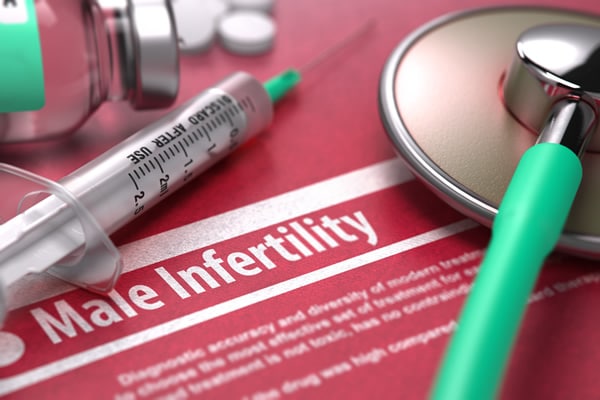Despite what many people think, infertility is not largely a female problem. Male infertility is a problem concerning many men across the globe. In fact, it is a factor in 30%-50% of infertility cases, making male factor infertility a very common contributing cause of infertility. This is why Team Miracle recommend a simple semen analysis as one of the first tests an infertile couple should do. Besides being inexpensive, semen analysis also yields valuable information that can help the fertility expert evaluate the case better and suggest a proper course of action.
That said, the good news is that male infertility is no longer an unsolved riddle. With the advancements in reproductive medicine, male infertility can be treated in the majority of cases with impressive results at the Cyprus IVF Centre.
Causes of Male Factor Infertility
A man could have male factor infertility due to a number of reasons, such as:
Structural Abnormalities (of the reproductive tract) – These consist of obstructions that block (either partially or completely) the flow of sperm and/or seminal fluid. They may be congenital (present at birth), be the result of a previous surgery or have occurred after an infection of the urogenital tract.
Inhibited Sperm Production – This occurs due to a previous vasectomy that has damaged the nerves that innervate the male reproductive tract and testicle, varicocele (veins inside the scrotum are enlarged) or sperm production issues.
Ejaculatory Disturbances – These do not allow the sperm to reach the female and include impotence (Erectile Dysfunction) and Retrograde Ejaculation (the semen enters the bladder rather than going out through the urethra).
Finally, the man with male factor infertility could have immunologic disorders, such as endocrine disorders, DNA fragmentation or antisperm antibodies that prevent the sperm from successfully penetrating the woman’s egg in her genital tract.
Treatment of Male Factor Infertility
(i) The Tests
Phase one involves a comprehensive semen analysis where Team Miracle experts evaluate the semen to determine the concentration, motility and morphology of sperm. According to results, we may ask for an additional evaluation of the male partner. For example, if the concentration of the sperm is very low, Team Miracle may require a genetic and hormonal evaluation of the patient, including total testosterone level, FSH, TSH, and LH to determine whether the problem lies in the signals the brain sends to the testicle to manufacture sperm or not. To exclude genetic abnormality, we may also do a blood karyotype test (chromosome analysis) to see if the lack of sperm manufacturing is caused by a genetic abnormality or DNA fragmentation test. If these tests do not show an indication of any problem, we will consider obstruction and follow a different course of action.
(ii) Available Treatments
Phase two involves deciding which treatment is most suitable for the male factor infertility issue. Our doctors will advise on the best course of action.
Intracytoplasmic Sperm Injection (ICSI)
ICSI is the best option for men with motility issues. In normal conception, sperm must travel from the female’s vagina and make their way to the fallopian tube where the egg will be waiting for fertilisation. Contrary to popular belief, there is only a window of approximately 12 hours for successful fertilisation to occur so, even if intercourse is timed perfectly, sperm with poor motility, will never make it to the egg in time. In ICSI, we inject a single sperm directly into the egg to fertilise it. This means that even an immotile sperm can be used for fertilisation. To select the best sperm, our expert embryologists analyse the sample under the microscope and choose the sperm with the best appearance. After the injection of the sperm, the egg is then placed in a lab dish and kept in the safe environment of an incubator, where the temperature is controlled, so that the fertilisation can occur. About 3=5 days after the collection of the egg, the embryo is transferred into the mother’s uterus.
This method has already brought lots of success even to men with the severest degrees of male infertility, considering the impressively high success pregnancy rates. We only need a single sperm to fertilise each egg, which makes motility no longer a factor in fertilisation with ICSI.
Intracytoplasmic Morphologically-Selected Sperm Injection (IMSI)
Sperm quality disorders range from low motility or count to a total absence of sperm production. As for the sperm’s morphology (shape of the sperm cell), it is a very important factor that reflects the sperm’s ability to fertilise the egg. Abnormal sperm will struggle to fertilise the egg or may create an abnormal embryo leading to miscarriage. For men with a very low normal morphology (<4%) there is high chance of fertilisation failure, so we need more specialised treatments, such as IMSI.
During the IMSI process, sperm samples are analysed by our Clinical Embryologist using a high powered microscope which is close to 6000 times more powerful than the normal ICSI microscopes.
The IMSI technique enables the Team Miracle embryologists to select the very best quality sperm from the sample provided to inject into each egg, thereby increasing the fertilisation rate, the success of implantation and, more importantly, the live birth rate.
TESE (Testicular Sperm Extraction)
TESE is an excellent option that can both diagnose and treat severe cases, especially of men that have had a vasectomy or a failed reversed vasectomy. The Team Miracle urologist will biopsy the testicle to extract sperm cells from the testicular tissue. The embryologist will then select the best sperm and inject them into the eggs via the ICSI procedure. The 15 minute TESE procedure at the Cyprus IVF Centre is conducted under local anaesthesia and men report feeling little to no discomfort afterwards.
PESA (Percutaneous Epididymal Sperm Aspiration)
During this procedure, we extract fluid from the epididymis (the narrow tube that carries sperm from the testes to the ductus deferens). Then Team Miracle embryologists analyse that fluid and select the best sperm for ICSI. Although this procedure can be done under local or general anaesthesia, we strongly recommend the first which, along with sedation, gives a much faster recovery and minimises potential side effects significantly.
MESA (Micro-epididymal Sperm Aspiration)
If a patient has blocked vas deferens (sperm cannot be conveyed from the testicle to the urethra), then MESA is the premium procedure to use. Sperm is also retrieved directly from the epididymis and used to immediately conduct ICSI by the Team Miracle embryologist at Cyprus IVF Centre to increase fertilisation chances.
In addition to the medical procedures, there are many supplementary extras to help male factor infertility. For example, Team Miracle at Cyprus IVF Centre are the only hospital on the island to offer FertilePlus® sperm selection to patients. You can ask your patient coordinator to explain all the options if you are seeking treatment for male factor infertility.
Team Miracle work continuously towards granting your wish to start a family. At Cyprus IVF Centre, you will not only find cutting edge technologies, leading medical professionals, and state-of-the-art facilities but also friendly people that are by your side from day one and onwards, even after you are holding your baby in your arms!






